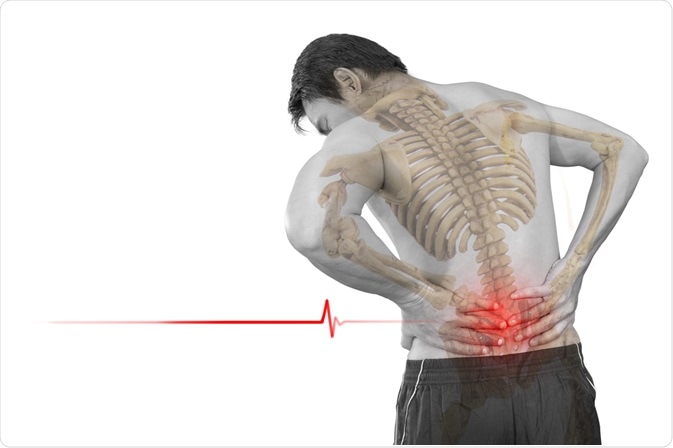For patients with lower back pain, the condition can significantly impact their daily activities. There are several ways to help patients living with lower back pain to improve their quality of life and enable them to partake in activities as normal.

Image Credit: narin phapnam / Shutterstock.com
Low-impact exercises and stretching
It is important for individuals with lower back pain to stay physically active and maintain the strength and flexibility of the muscles that provide support to the spine and lower back. Stretching and low-impact exercises are the most beneficial practices for this purpose, as they help to increase strength without adding to the stress and strain on the area.
Some of the activities that may be particularly helpful in reducing the symptoms of lower back pain include:
- Walking
- Swimming
- Cycling
- Yoga
If patients have had a prolonged period of inactivity, reintroducing this type of low-impact exercise to regain strength is especially important.
Stretching is important to improve the flexibility of the connective tissues and can help to prevent worsening of lower back pain. This is essential before and after any physical activity that may put a strain on the back muscles.

Image Credit: Prostock-studio / Shutterstock.com
Posture
Another influential factor in the development of lower back pain is the way that people hold their bodies while standing or sitting. All patients should be advised to avoid slouching and focus on keeping a good posture constantly, as this helps to reduce the abnormal curvature of the spine.
Some good tips to improve posture include:
- Use work surfaces that are at a comfortable height for the individual.
- Adjust the seat to the appropriate position and height for the task.
- Opt for a chair with good lumbar support.
- Keep the shoulders back and the back straight.
- Move around and stretch muscles regularly during intervals to relieve muscle tension.
- Place a small firm pillow behind the lower back to increase lumbar support.
- Wear comfortable footwear.
- Sleep on a firm surface.
- Avoid sleeping on the stomach.
Diet and lifestyle
Excess weight is associated with an increased risk of lower back pain due to the additional stress the weight puts on the spine and connective tissues. For this reason, it is helpful for people affected by lower back pain to lose weight if they are too heavy.
Both regular physical activity and a healthy diet are important for achieving sustainable weight loss. A diet with an adequate intake of calcium, phosphorus, and vitamin D should be recommended to promote the strengthening of bones.
Smoking reduces the blood flow to the lower spine; as a result, smokers are more likely to be affected by spinal disc degeneration, osteoporosis, coughing, and lower back pain. Therefore, it is recommended for patients with lower back pain who smoke to quit as soon as possible.
Mental health
Individuals with chronic lower back pain are more likely to suffer from psychological disorders, such as depression, due to the effects of the condition. It can be difficult to cope with the lifestyle changes that lower back pain can necessitate.
Another challenge is the difficulty people may experience in going about their normal daily routine. Additionally, people with lower back pain who opt for bed rest have a further heightened risk of depression.
It is important for patients to have a strong support network and continue to participate in activities that they enjoy. With appropriate pain management techniques, it should be possible for patients to resume such activities, which helps to improve their quality of life and mental health.
Prevention
Lower back pain is most often caused by mechanical stress or strain to the spine or connective tissues such as tendons and ligaments in the lower back.
Certain activities can increase the risk of mechanical stress developing or worsening lower back pain. These include heavy lifting, poor posture, repetitive motion, vibration, and contact stress. As a result, individuals affected by or prone to lower back pain may benefit from avoiding such activities.
References
Further Reading
Last Updated: May 10, 2021